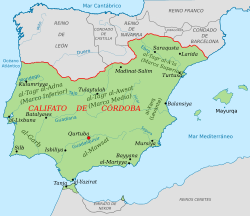Caliph of Córdoba
| Caliphate of Córdoba | ||||||||||
|
خلافة قرطبة Khilāfat Qurṭuba (Arabic) |
||||||||||
|
||||||||||
|
Caliphate of Córdoba (green), c. 1000.
|
||||||||||
| Capital | Córdoba | |||||||||
| Languages | Arabic, Berber, Mozarabic | |||||||||
| Religion | Sunni Islam | |||||||||
| Government | Monarchy | |||||||||
| Caliph of Córdoba | ||||||||||
| • | 929 – 961 | Abd-ar-Rahman III | ||||||||
| History | ||||||||||
| • | Abd-ar-Rahman III proclaimed Caliph of Córdoba | 929 | ||||||||
| • | Disintegrated into several independent taifa kingdoms | 1031 | ||||||||
| Area | ||||||||||
| • | 1000 est. | 505,000 km² (194,982 sq mi) | ||||||||
| Population | ||||||||||
| • | 1000 est. est. | 7,000,000 | ||||||||
| Density | 13.9 /km² (35.9 /sq mi) | |||||||||
|
||||||||||
| Today part of |
|
|||||||||
The Caliphate of Córdoba (Arabic: خلافة قرطبة; trans. Khilāfat Qurṭuba) was a state in Islamic Iberia along with a part of North Africa ruled by the Umayyad dynasty. The state, with the capital in Córdoba, existed from 929 to 1031. The region was formerly dominated by the Umayyad Emirate of Córdoba (756–929). The period was characterized by an expansion of trade and culture, and saw the construction of masterpieces of al-Andalus architecture. In January 929, Abd-ar-Rahman III proclaimed himself caliph (Arabic: خليفة) of Córdoba in place of his original title, Emir of Córdoba (Arabic: أمير قرطبة 'Amīr Qurṭuba). He was a member of the Umayyad dynasty, which had held the title of Emir of Córdoba since 756.
The caliphate disintegrated during a civil war (the Fitna of al-Andalus) between the descendants of the last caliph, Hisham II, and the successors of his hayib (court official), Al-Mansur. In 1031, after years of infighting, the caliphate fractured into a number of independent Muslim taifa (kingdoms).
Abd-ar-Rahman I became Emir of Córdoba in 756 after six years in exile after the Umayyads lost the position of Caliph in Damascus to the Abbasids in 750. Intent on regaining power, he defeated the area's existing Islamic rulers and united various local fiefdoms into an emirate. Raids then increased the emirate's size; the first to go as far as Corsica occurred in 806.
...
Wikipedia

